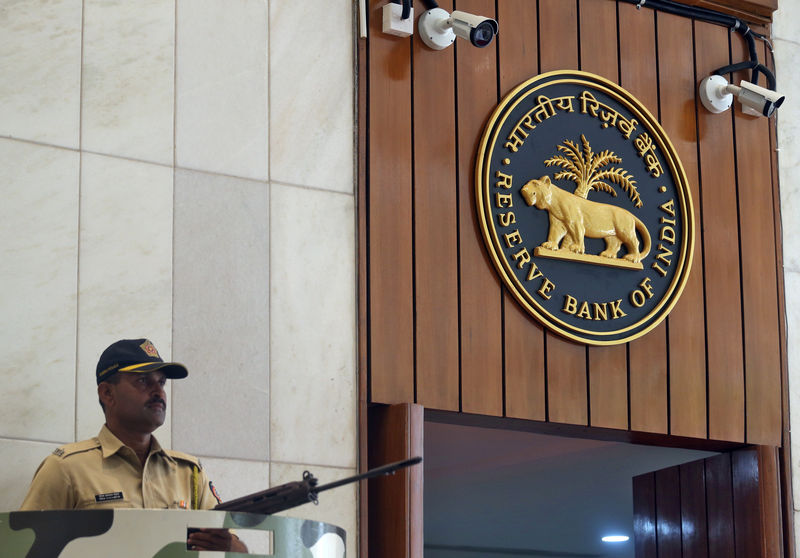By Aftab Ahmed
NEW DELHI (Reuters) - India's slowing economy will need a boost soon after the current election but budget stresses mean New Delhi probably has to rely on the central bank to provide it through more interest rate cuts, according to two senior finance ministry officials.
The government lacks the ability to hike already-planned spending to spur growth, they said, as revenue in the year ending March 2020 is likely to be below target while borrowing will rise, mainly for a new farm support scheme.
"Right now the government is not thinking of any stimulus. I do not think we can afford it, as any package would ultimately lead to higher borrowing," one of the ministry officials, who insisted on anonymity, told Reuters.
The government has a fiscal deficit target of 3.4% of gross domestic product for 2019/20.
The finance ministry did not respond to a request for comment.
A LIMITED IMPACT
While the Reserve Bank of India (RBI) is likely to be open to more policy easing, provided inflation does not surge, their impact on economic activity may be limited, given debts burdening India's state banking sector.
Two rate cuts this year have barely reduced loan and deposit rates.
The finance ministry official said the RBI needs to provide additional liquidity to ensure rate cuts pass to bank customers. The central bank has injected $13 billion into the system in the past two months through open market operations and forex swaps, but the officials expect more.
The second official said the ministry is working on a plan to infuse capital into state-run banks in exchange for equity. State-run banks have asked for a 500 billion rupees ($7.12 billion) fund infusion in 2019/20, sources said.
Economic growth, which hit a five-quarter low of 6.6% in October-December, appears to be slowing. March industrial output contracted for the first time in nearly two years, surveys show a slackening in manufacturing and services growth, while car and motorbike sales have tumbled.
The slip in growth comes at a time many economists are questioning the quality of official data and suggesting past levels have been overstated.
GRAPHIC: India's economic growth slows down - https://tmsnrt.rs/2LHuyb4
The trade war between the United States and China has sparked worries about a weakening in the global economy. New Delhi officials are concerned that low-cost Chinese goods which can't find a home in the United States might be dumped in India.
Indian economists agree that the next administration - whether again led by Prime Minister Narendra Modi and his Bharatiya Janata Party (BJP) or by its opponents - will urgently seek to lift growth.
The 39-day Indian general election ends on May 19, with counting of votes on May 23.
The central bank has cut its benchmark repo rate by 50 basis points this year to 6.0%. The two finance ministry officials said the government expects at least another 50 bps cut by August. The next RBI policy meeting is June 6.
Gopal Krishna Agarwal, BJP's economic affairs spokesman, said the government "needs to focus on lowering of interest rates, higher spending and asset creation so that demand is created." The party proposes spending 100 trillion rupees over five years to build roads, railways, ports and rural infrastructure.
Indian media this week quoted a senior official as saying the corporate affairs ministry is working on a plan to waive debt of very small businesses and individuals with annual earnings below 60,000 rupees, or about $850. That could cost as much as 200 billion rupees.
But finance ministry officials say any such plan would have to be funded by budget cuts elsewhere and is unlikely to start in the current fiscal year.
FOCUS ON STABILITY
The Congress party has pledged to give 72,000 rupees to each of India's poorest families, but this won't be immediately implemented, should it form the government, due to concerns this will make the fiscal deficit balloon.
"The immediate focus has to be the macro-economic stability," P. Chidambaram, former finance minister and a senior Congress leader, told Reuters. "It's only when the growth process starts we can find the revenues for implementing all this."
In the 2019/20 budget, the government expanded its borrowing program by 1.4 trillion rupees to more than 7 trillion rupees.
The government expects to fall short of its 2019/20 indirect tax target of 13.8 trillion rupees, 20% above last year, making it harder to meet its revenue target. Also there could be losses from state-run banks and other companies, such as Air India, which might need further government support.
"In 2019/20, fiscal deficit is expected to be much higher than the budget target," predicted former RBI Governor Bimal Jalan.

($1 = 70.2360 Indian rupees)